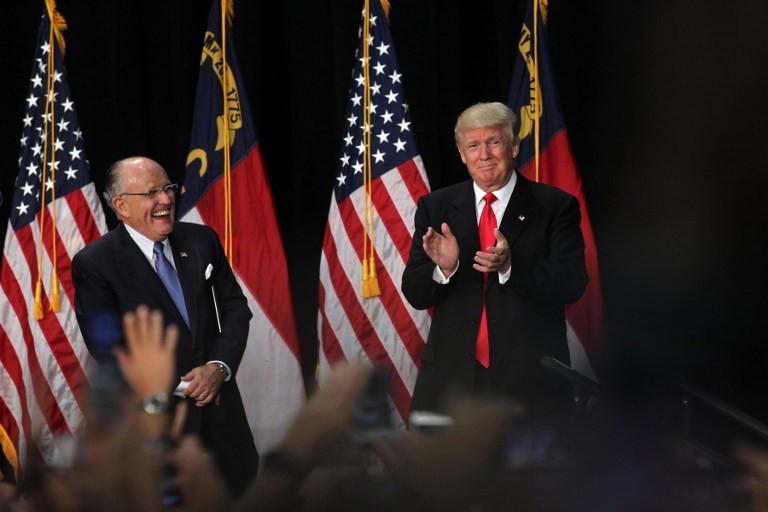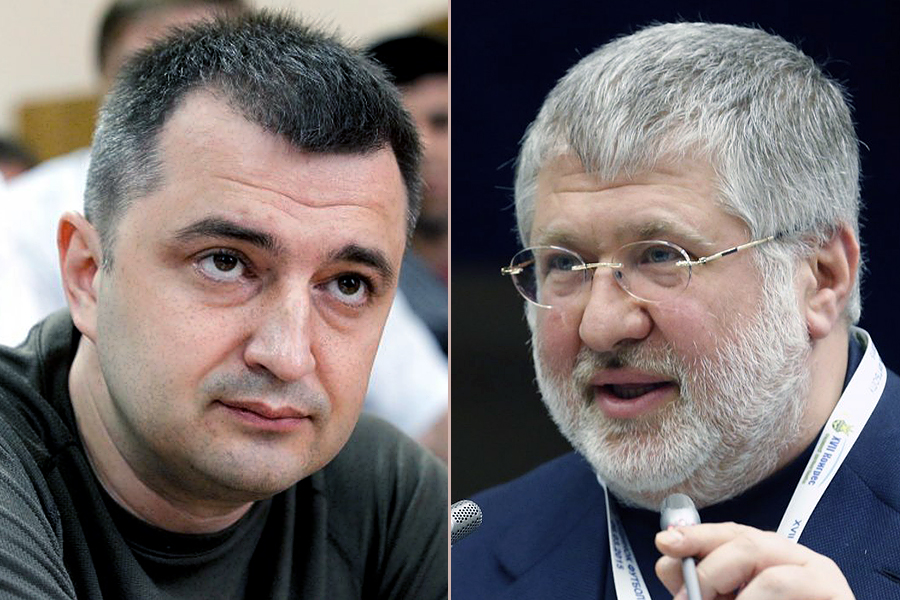The conspiracy theory that U.S. President Donald Trump and his allies have built, baselessly accusing his opponent Joseph Biden of abuse of power, is the work of many authors, both in the U.S. and in Ukraine.
The Ukrainian side, however, includes people with highly dubious reputations who also have executed political orders while serving in public offices.
In addition to the former two prosecutors general, Yuriy Lutsenko and Viktor Shokin, who are already well-known in the U.S. for their role in the Trump-Ukraine scandal, the impeachment phonebook reveals another name. This is a middle-class Ukrainian prosecutor who has implied that Biden and his son were implicated in political corruption in Ukraine, prompting Trump’s team to take further steps to pressure Ukrainian authorities.
His name is Kostyantyn Kulyk, and recently he appeared in the main section of the New York Times newspaper.
In addition, Trump’s personal lawyer Rudy Giuliani referred to him as one of his informants in a recent TV interview on Fox News. And Giuliani, according to the New York Times, went to Kyiv on Dec. 4 to meet with Kulyk, among other former prosecutors who fed the former New York City mayor the unsupported claims about the former vice president, helping to smear Biden and former U.S. Ambassador to Ukraine Marie L. Yovanovitch in the process.
The Republicans have embraced these unsupported or false claims, which have included Giuliani’s attacks on me for publicizing the black ledger of illegal payments mainly to Ukrainians during ex-President Viktor Yanukovych’s time, but also to the ousted leader’s American political adviser, Paul Manafort, who was Trump’s campaign manager. Manafort is now serving a 7.5-year prison sentence on tax evasion and money laundering convictions, based on $11.7 million in secret payments to him from Yanukovych.
According to the New York Times article, Giuliani also met in Budapest on Dec. 3 with Lutsenko and was seeking meetings in Kyiv with Lutsenko’s predecessor, Shokin, both of whom were better at protecting corruption in Ukraine than prosecuting crime.

Rudy Giuliani introduces then-Republican presidential candidate Donald Trump at a rally on Aug. 18, 2016, at the Charlotte Convention Center in Charlotte, North Carolina. (AFP)
Even in the impeachment scandal, Kulyk’s careless approach to the facts stands out.
In his attempts to weigh in on the Biden conspiracy and be helpful for Trump’s administration, Kulyk did not burden himself with getting his information straight. He also had little understanding of American politics. For example, he wrote a memo arguing that Biden agreed to help the Ukrainian authorities establish relations with the Trump administration for a bribe, even though they were representatives of rival parties. He also claimed that then-Prosecutor General Shokin was dismissed in April 2016 because he was investigating Biden, although Ukrainians know that this happened for the opposite reason — because of Shokin’s reluctance to investigate anyone of any importance. And there are many such examples.
And here is the other news — Prosecutor General Ruslan Riaboshapka on Nov. 25 fired Kulyk. But the firing had nothing to do with Kulyk’s efforts to go down in American history. Kulyk did not show up for mandatory vetting at the Prosecutor General’s Office in October. According to the prosecution law, prosecutors who refuse to be vetted can be fired.
Kulyk did not appear for the vetting because he knew he wouldn’t pass the last stage of examination — evaluation of integrity. The prosecutor, who was lionized by Giuliani, was the subject of many journalistic investigations that have exposed his lavish lifestyle that doesn’t match his official income.
He also nearly ended up in jail for illicit enrichment. A court had already been hearing Kulyk’s case when all of a sudden in the run-up to the 2019 presidential election (when former President Petro Poroshenko’s prospects for re-election grew increasingly dim) the Constitutional Court abolished the norm of punishment for illicit enrichment. The case was closed.
There is much more to Kulyk’s dismissal than just another reshuffle. This decision was not easy for Riaboshapka. After all, firing Kulyk served as more evidence of the further breakup of the Zelensky’s administration with billionaire oligarch Ihor Kolomoisky.
In addition to the fact that Kulyk tried to be useful to Giuliani in making up a conspiracy theory, he was also a secret weapon for Kolomoisky, who is under ongoing investigation in the U.S. For Kolomoisky, prosecutor Kulyk has become a convenient tool for achieving his goals, including in the U.S.

Ex-Ukrainian prosecutor Kostyantyn Kulik and billionaire oligarch Ihor Kolomoisky. (UNIAN)
Kolomoisky used Kulyk to go after his rival and former business partner Vadym Shulman. This man was the one who testified against Kolomoisky in the FBI, which formed the basis for the U.S. investigation of the oligarch.
As part of this investigation, one of Kolomoisky’s business partners Mordechai Korf was questioned by a grand jury in Florida about the oligarch’s ownership of some of the companies in the U.S. This had forced Kolomoisky to flee Switzerland, where he lived for years, for Israel in 2018, fearing possible extradition to the U.S.
As it turned out, Kulyk found a way to be useful for the oligarch. His next steps resembled a bad comedy. Kulyk decided to imply that Shulman, who has lived in the U.S. for many years and holds Israeli citizenship, is a member of the criminal organization of ex-Ukrainian President Viktor Yanukovych. Kulyk had been in charge of this case and had all the power as to who to include or exclude from the list of members of what is known as “Yanukovych’s criminal organization.”
One month before Poroshenko’s defeat in the March 2019 election, when some officials began to switch allegiance, Kulyk formally accused Shulman of laundering $100 million through Kolomoisky’s personal bank accounts. He then supposedly transferred this amount to his own accounts in Switzerland and Monte Carlo.
Based on this accusation, Kulyk quickly placed Shulman on the national and international wanted lists, and also arrested his bank accounts. Although the case included high-profile officials, no information about it has been released to the press. The loud revelation that Kulyk should have been proud of didn’t make it to the public. And the only explanation is that it is a sham. The purpose of it was to simply force Shulman to make concessions to Kolomoisky. We don’t know if he did.
Meanwhile, Kolomoisky evidently decided to use the impeachment process to show his favor to the Trump team. Like Kulyk, Kolomoisky is fueling the anti-Biden and anti-Ukraine conspiracy theory that Giuliani designed.
Lawmaker Oleksandr Dubinsky, who heads Kolomoisky’s influence group in the Ukrainian parliament, has joined a public campaign led by pro-Russian lawmaker Andriy Derkach aimed at shifting responsibility for interference in the 2016 U.S. election from Russia to Ukraine.
The ultimate goal of this is to assist the Trump team in their strategy of getting out of both the impeachment scandal and accusations of cooperating with Russia during the 2016 election.
Dubinsky claimed that former U.S. Ambassador to Ukraine Marie Yovanovitch was behind the publication of the so-called “black ledger” of Yanukovych’s party that implicated Trump’s campaign manager Paul Manafort in receiving payments from Yanukovych.
This allegation works for Trump and Giuliani, but doesn’t pass even the most basic fact-checking — Yovanovitch arrived in Ukraine after the release of Manafort’s records.
Meanwhile, Kolomoisky and his U.S. business partners are facing civil claims that they helped launder hundreds of millions from the Ukrainian PrivatBank, which Kolomoisky co-owned until 2016, by buying office buildings and businesses in the U.S.
In November, Kolomoisky’s side got reinforcement. His business partners hired Marc Kasowitz, a New York-based trial lawyer that worked for Trump, to represent them in court.
Kolomoisky is not the only oligarch in Ukraine trying to use the window of opportunity to solve his problems. Dmytro Firtash, who is wanted by the FBI on suspicion of bribing officials in India and has been stuck in Austria for five years, fighting extradition to the U.S., is doing the same.
Firtash also swapped attorneys this year and hired one close to Giuliani. At the same time, he passed on to Trump’s attorney some statements obtained by his lawyers from former Prosecutor General Shokin. Giuliani actively quotes those findings on TV. Firtash’s people in parliament are also trying to help Giuliani and Trump by setting up an investigative commission.
It is clear that Firtash wants to convert this favor into the dropping of the charges in the U.S.
It is strange to see how Giuliani, who boasts his fight against the mafia during his time as a prosecutor, now works with people he would previously have been happy to put in jail.
